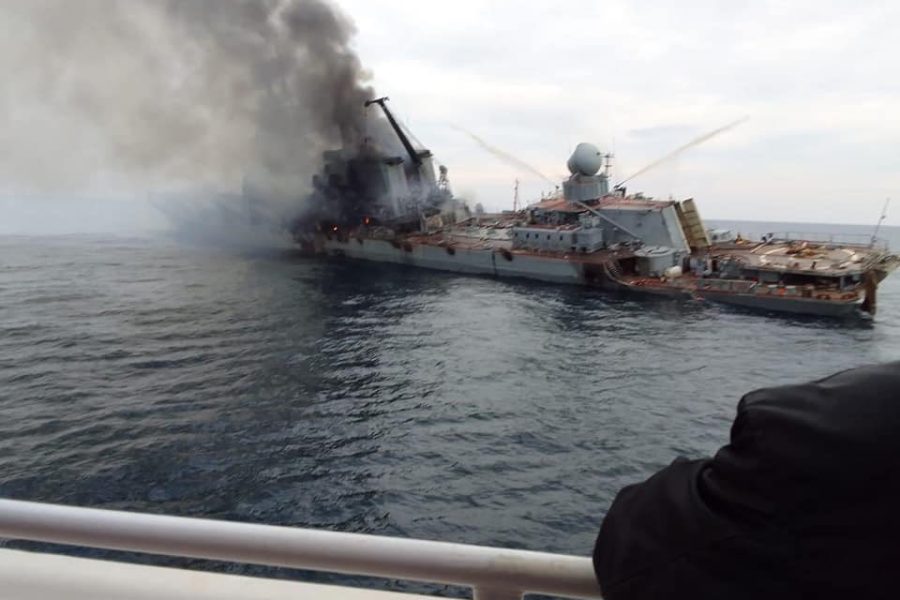Urging support for Ukraine, British foreign secretary and former prime minister David Cameron argued aid rendered so far has provided a huge return on investment for the U.S. and the West, not only preventing Russian President Vladimir Putin from chalking up a “win”—which would encourage him toward more aggression—but sending a message of unity to China and reassuring U.S. allies.
Speaking at the Aspen Institute on Dec. 7, Cameron said America has spent about 10 percent of one year’s defense budget aiding and arming Ukraine since Russia’s invasion in early 2022. With that, Ukraine “has destroyed half of Russia’s pre-war military assets.”
“Now, if that isn’t a good investment, I don’t know what is,” Cameron said.
“Ukraine doesn’t even really have a navy, but they have managed to sink about a fifth of the Russian Black Sea Fleet. … I’m sure the Pentagon is excited by the value for money on offer, there. I mean, it’s a remarkable thing,” he added.
Amid uncertainty over whether Congress will approve more aid for Ukraine, Cameron argued for more support and patience, saying the ultimate outcome in Ukraine “takes time … and is worth investing in.”
It’s an investment being shared across the world, Cameron said—European military, civilian, economic, and humanitarian aid is roughly $160 billion, and the U.K. is the second largest donor after the U.S. at $44 billion
Ukraine aid has also helped reinvigorate the U.S. industrial base, Cameron noted, pointing to recent analyses that found almost 90 percent of the money spent on Ukraine stays in America to manufacture weaponry and materiel.
That production is key, he added, because the Russian invasion has been “a tremendous wake-up call to the West” to resume building up war stocks.
“All of that work that’s taking place is very important. And I think we’re at a point where we’ve got to stop thinking about how we’re running down our existing stocks to supply Ukraine,” Cameron said. “We need to think much more about how we build up our stocks. And I think in [a] more dangerous and insecure world … supply chains, stocks, defense commitments, these things have become more important.”
Given the positives, it is critical Congress approve more aid to encourage other allies around the globe to keep supporting Ukraine, he said.
“You’ll be able to go to all the other European countries and say, ‘right, you’ve seen what the US have done. Now [you] will need to join in,’” Cameron said.
Failure to support Ukraine, on the other hand, would be “a victory for Putin … and if it is, it won’t be the end of this,” Cameron predicted.
“If we let him win in Ukraine, it will be somewhere else next. And it won’t just be American money that’s at risk. It might be a NATO country [that is attacked], so it could be American lives,” he said. Avoiding all this is worth “10 percent of your defense budget.”
Addressing criticism of corruption in Ukraine, Cameron said “Ukraine isn’t perfect” but is focused on fighting potential corruption to head off just such charges.
He also countered critics who say sanctions against Russian assets outside Russia haven’t worked. “That’s $400 billion” that Russia doesn’t have “for its war machine,” he said.
“I think there’s a very strong argument for saying, let’s, instead of just freezing that money, let’s take that money. Spend it on rebuilding Ukraine … if you like, a down payment on the reparations that Russia will one day have to pay for the illegal invasion that they’ve undertaken,” Cameron said, suggesting it is one of the topics he will take up in meetings with U.S. Secretary of State Antony Blinken this week.
Cameron confessed to sometimes hoping for a return to better days like the late 1980s and early 1990s, —when “the Berlin Wall was falling, the Soviet Union was breaking up. Russia was becoming a friend, China was joining the World Trade Organization. Democracy was spreading across Europe and in many ways across the world, more and more countries, were adopting market-based economics,” he said.
But the West has to accept that those days are not coming back anytime soon, Cameron warned, calling Ukraine “the great test for our generation, the great challenge for our generation: are we going to defend this democracy? And are we going to recognize that European security is also American security, and we should stay united on this?”
Making a final pitch for more U.S. aid to Ukraine, Cameron warned that “if that money doesn’t get voted through, there are only two people that will be smiling. One of them is Vladimir Putin in Russia. The other one is Xi Jinping in Beijing. And I don’t know about you, but I want to I don’t want to give either of those people a Christmas present.”

